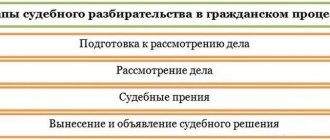In a divorce, jointly acquired property is divided equally - this is a legal norm. But in addition to property, married people “acquire” children together. And their “division” between divorcing spouses is the most difficult, ambiguous and painful part of divorce proceedings.
After all, a living person (even a very small one) is not cups/spoons, cabinets/sofas, apartments/cars. Its value cannot be expressed in monetary terms. Moreover, depending on which parent remains nearby, the formation of the personality and the future fate of the child often depends. In essence, the court is given a disproportionate responsibility to make a decision, the consequences of which may be long-term and ambiguous.
However, certain rules and regulations regarding establishing custody of a child after a divorce exist and apply.
Who should the child stay with after divorce?
There are two opposing stereotypes in the mass consciousness:
- Some believe that the child will remain with the mother in any case, since the courts believe that only a woman can provide him with normal care and the “home environment” necessary for normal development
- Others believe that a father with material resources and social influence will always find a way to “take” a child away from a woman
In practice, none of these statements can be considered one hundred percent true. As a matter of law, neither parent is initially the “priority owner” of the child. In each individual case, the decision is made by the court individually, taking into account specific factors.
Another thing is that this is not so easy to do if each parent “pulls the blanket over himself.” And this is, alas, not uncommon during a divorce through the court. In such cases, children serve as a kind of “leverage of pressure” on the opposite side in order to achieve the most favorable terms of divorce for themselves or simply to hurt the ex-husband or wife more painfully.
Consideration of “children’s” claims by the court
If parents are unable to agree amicably on the division of their child, then such a decision is made exclusively by a judicial authority. The beginning of the consideration may be the filing of a claim by one of the divorcing spouses.
The main rule that the judge must be guided by is respect for the wishes, interests and rights of the children themselves.
In practice, this means the degree of attachment to one or another parent, to sisters and brothers, existing relationships, opportunities for life and education, and many other circumstances.
We recommend that when filing a claim for divorce if there is a child, you justify all additional arguments that the court could take into account, namely:
- child's hobbies,
- his surroundings
- the presence of an established team in the school, sections,
- preferences for visiting educational and sports institutions based on the area of residence.
Can children be separated in a divorce?
The term “division of children” does not exist either in theory or in the articles of the law. Children are not property, they are not divided. The court only determines which parent the child will live with, who will pay child support for him and in what order, what will be the mode of communication between the parent living separately and the child or children.
However, divorcing parents themselves use this term frequently and specifically. Is it possible to share children among each other? Especially if there are several of them. For example, make sure that sons live with dad and daughters live with mom. Or the older ones with dad, and the younger ones with mom? Or one child - to the father, and the second - to the mother?
The court does not prohibit the separation of children during a divorce, but does not insist on it. It is believed that such issues can be resolved based on the wishes of the parents and/or the children themselves (if they are already 10 years old). The main thing is to take into account all the circumstances. And this is not always possible.
Example
Married couple A and B were getting divorced and had two teenage children: a 9-year-old girl and a 14-year-old boy. Contrary to the traditional distribution of family relationships (girls are closer to mom, boys are closer to dad), in this family everything was a little different. The children loved both parents, but the boy preferred to spend time with his mother. Moreover, they had a common hobby - music. The girl, as they say, “took after her father.” She willingly went on hikes with him and played outdoor sports games. Musical instruments and sound-reproducing equipment went to the mother during the divorce. Tourist equipment, exercise equipment, sports equipment - to the father (in accordance with the rule on priority transfer of property to those parties who use it more often)
During the divorce, the parents agreed that they would “split” the children in half, which would simplify living and financial conditions. The boy, who was already over 10 years old, was asked who he would prefer to stay with, and he replied that he was ready to live with both his mother and father, although he liked his mother better. The girl was not asked - she had not yet reached the age that would allow the court to take her wishes into account. As a result, the court considered it appropriate to leave the daughter with her mother, since she is still small, and during the period of puberty it is more comfortable for a girl to be in the same house with a woman, rather than with a man. Accordingly, the son moved to live with his father.
The court, of course, was guided by the interests of the children when making its decision, but could not take into account all the circumstances. The children found themselves “cut off” from the parent with whom they were more interesting and comfortable, and even from the things that ensured that they could do what they loved. However, it is obvious that this was a forced decision. We can only hope that the parents will maintain a normal relationship after the divorce and leave both houses “open” for their children together in order to provide them with at least minimal mental comfort.
If the mother does not work and has no source of income
The very fact that the mother has no income or official work is not decisive. For children under 3 years of age, the mother’s employment is not taken into account at all, since the baby’s mother has the right to receive alimony from the child’s father.
If we are talking about children over 3 years of age, then the ability of the child’s mother to provide a decent life for her children is assessed taking into account:
- Additional, official, unofficial and passive sources of income;
- Availability of property, housing;
- Help from parents and other close relatives;
- The reasons why the mother does not work and has no source of income.
The mother's lack of work is taken into account by the court, but is not used as the basis for the court's decision. The main requirement is that the mother’s income, including that received through benefits, etc., be sufficient to provide for the child. At the same time, the father is also not relieved of the obligation to support common children, because in this part both parents are equal before the law.
How to divide children in divorce?
There is a principle in this area that is common to most family law matters:
- It is possible to conclude a settlement agreement regulating all “children’s” issues – from the amount and nature of alimony to the place of residence of the child or children
- If it is not possible to agree “good”, you will have to leave the disputed issues to the court. The claim is filed in a city or district court. He will determine with whom the children will live and how the other parent will participate in their financial support.
○ What does the Family Code say about the division of children?
Family law, and in particular Art. 61 of the RF IC, it is established that parents bear equal responsibilities for the maintenance and upbringing of minors. But this, you see, is only possible if they live together. What to do if the marriage breaks up? Who should the child stay with? He cannot live with both of them at the same time. Does the child have the right to visit a child ?
The legislator has established several options for solving this problem:
- The place of residence of the child and the procedure for communicating with him are determined by the spouses independently with mutual consent .
- The decision on this issue is decided by the court.
[ ]
Settlement agreement between parents regarding children during divorce
All issues concerning the life of children after divorce can be resolved peacefully and in a civilized manner - by concluding an agreement. It may contain:
- Who will the child live with permanently?
- How will the other parent help him financially?
- How will the child communicate with the parent living separately?
The drawn up agreement is certified by a notary and presented to the magistrate's court. If its conditions do not infringe on the rights of children, it will be approved by a court decision.
Naturally, drawing up and signing an adequate agreement is possible only in the case of a “peaceful” divorce, when the parents are able to listen and hear each other and calmly plan their future lives. If the mother and father are “ready to scratch each other’s eyes out” at any contact, they are no longer interested in respecting the interests of the children and concluding peace treaties. In such a case, litigation becomes inevitable.
How to divide 1 baby?
Further residence is certainly decided on the basis of the agreement reached by the couple. The impossibility of reaching an agreement is determined by the use of levers and tools of the judicial concept. In order to achieve a positive decision, each party is obliged to provide the court with compelling evidence in favor of their right to a child in the event of a divorce - this is established by the Code of Civil Procedure of the Russian Federation.
Trial
It should be recognized that the “division of children by court” initially means that the mother and father are, by and large, indifferent to the interests of the children. They argue with each other, trying to prove something to each other or “win” in the conflict. That is, simply put, they use their children as tools in their own interpersonal conflict.
Such processes are very long, unsightly, painful, and full of difficult struggle between the parties. The court faces a difficult task - to understand the true motives of the divorcing couple and make a decision that would benefit the children, and not one of the parties seeking to prove their case and “win.”
Application to court
A parent filing a claim that a child should live with him after a divorce will have to provide convincing arguments in favor of his point of view.
It is important to logically and consistently present the circumstances (for example, that the father in the marriage did not pay attention and time to raising the children, communicated little with them, did not prepare food for them, did not go for walks, did not pick them up from kindergarten, and therefore the child will be more comfortable with a mother who did it). You should also back up your words with evidence that you can provide the child with better conditions for growth and development than the second spouse.
Simultaneously with this claim, a claim is filed to recover child support from the other parent.
Grounds for selecting a child
In Russian judicial practice, there are still situations when a child is left with his father despite the objections and wishes of the mother. How and why does this happen?
- Firstly, the court evaluates all the above circumstances.
- Secondly, there are a number of factors, the presence of which ensures a solid tipping of the scales in favor of the baby’s father.
What grounds will be accepted by the court as sufficient for leaving the child with the father?
- Repeated neglect by the mother of parental responsibilities;
- Established facts of violence or humiliation of a minor;
- Failure to fulfill responsibilities for the maintenance or education of one’s child;
- Alcoholism, drug addiction, antisocial lifestyle.
All these facts must be proven by the husband if he wants to take the child away. The child’s mother does not have to prove anything, since according to the principles of civil proceedings, each party is obliged to prove the circumstances on which it bases its arguments.
Evidence of the mother’s dishonesty can include:
- Help;
- Decrees and decisions of courts on bringing to responsibility for failure to fulfill the duties of a parent or other offenses;
- Witness's testimonies;
- Conclusions and materials of guardianship authorities.
The court conducts a thorough examination of the evidence presented, interviews witnesses and parties, and requests additional information. And only after this is a decision made to leave the child with one of the parents.
Judicial procedure
The legal basis for such processes is Article No. 78 of the RF IC and Federal Law-124 “On the basic guarantees of the rights of the child.” To make an informed decision about which parent the child will live with after the divorce, the court examines all the circumstances and takes into account the following factors:
- Parents' wishes
The judge will have to determine the true motives of the parent who insists on living together with the child after the divorce.
Often, the desire of parents to “sue” a child has nothing to do with his interests, but only pursues the goal of “annoying” his ex-husband or wife.
It happens that a father convinces others that he dreams of living with his child and raising him. But in fact, he doesn’t even know how to prepare breakfast for him, has never been to a parent-teacher meeting at school, has no idea who the child’s friends are, what the name of his class teacher is, or what his school successes are.
Or the mother claims the same thing, but in fact “threw the child over to the grandmother” and is busy with her career or trying to arrange her personal life. If such facts are revealed during the trial, they naturally call into question the sincerity of the parental wishes.
- Child's wish
It is asked only to children who are over 10 years old. The conversation is conducted by an experienced guardianship official who is able to understand whether the child’s answer is sincere or whether he is simply “repeating what he was told.”
As for small children, the mother’s priority is recognized by default. It is believed that a woman copes better with caring for babies and provides them with the necessary emotional comfort. In addition, the court relies on the principle of the Declaration of the Rights of the Child, which states that separating a child from its mother can only be done in the most extreme cases.
- Moral character of parents
A parent suffering from alcoholism, drug addiction, gambling addiction, or leading an immoral lifestyle cannot count on being entrusted with custody of a child after a divorce. Even relatively “harmless” bad habits like smoking can become an obstacle to a court decision in favor of a child living with one parent or another
- Parents' financial capabilities
The court may take into account the fact that one of the parents has a more favorable financial situation compared to the other. “Rich” men often count on this when divorcing their unworking wives or wives with low incomes.
But the child’s interests are not limited to better food, an abundance of clothes and gadgets, or paying for an expensive school. If, according to other parameters, the mother can provide the child with better care and emotional comfort, the court will simply decide to assign a high amount of child support from the father.
- Social environment
The child’s communication with other relatives is taken into account. For example, if a child regularly and closely interacts with the father's parents, and is completely unfamiliar with the maternal grandparents, this may serve as a strong argument in favor of giving the child to the father. And vice versa.
- Region of residence
If parents live or plan to live in different regions or countries after a divorce, the characteristics of these places are taken into account. The court selects the economic, climatic, and cultural features of the territories where the child will live that are optimal for the child.
- Other circumstances
The lifestyle of the father and mother, their interests, and priorities are taken into account. For example, being too busy at work (long working hours, night shifts, frequent business trips) can serve as an obstacle to making a decision about living together with a child.
Although passion for work itself cannot in any way be attributed to “bad habits” or “immoral behavior.” Nevertheless, it is believed that a very busy person will not be able to devote enough time and mental energy to the child.
Psychological and pedagogical examination
There are situations when the court itself cannot make a decision about who the child will stay with. This happens when both parents have the most positive characteristics. Then the court orders a psychological examination and assigns it to a specific psychologist. He works with the minor and asks the following questions:
- the child is most attached to mom or dad;
- psychological relationships of the minor with each family member;
- which parent has more influence on the child;
- individual characteristics of a minor (psychological and psychiatric condition);
- whether the child’s opinion about which parent he wants to live with was imposed by someone.
A pedagogical examination is carried out if it is not possible to conduct a psychological examination. The court has the right to entrust it to a social educator. He asks all the same questions.
The role of guardianship authorities in divorce proceedings
Representatives of guardianship and trusteeship authorities are required to attend courts related to divorces in the presence of minor children. This is a procedural requirement.
In addition, before the process, guardianship authorities conduct a study of the living conditions of the children. Based on the inspection of the child’s place of life, a report is drawn up, which is then presented to the court. In some cases, this document can be decisive.
For example, if a child lives with his mother in a semi-basement, damp room, in poor living conditions, and the father has a comfortable apartment with a room intended as a “children’s room,” the guardianship authorities may recommend handing over the child to the father.
Who determines the future residence of minor children?
The Family Code states that after a divorce, parents continue to have equal rights and responsibilities towards their children. Thus, both parents are obliged to care, raise and support children until they reach adulthood.
Parents have equal rights and bear equal responsibilities towards their children (parental rights).
Clause 1 of Article 61 of the Family Code of the Russian Federation
Both parents not only can take care of children, but also have an obligation
Parental rights terminate when children reach the age of eighteen (the age of majority), as well as when minor children marry and in other cases established by law when children acquire full legal capacity before they reach adulthood.
Clause 2 of Article 61 of the Family Code of the Russian Federation
Russian legislation always welcomes the attempt of parents during a divorce to reach mutual understanding and resolve the issue peacefully. After all, we are talking not only about the difficulties of preparing documents during the trial. First of all, the rights and interests of the child must be preserved. In rare cases, guardianship authorities are competent to resolve this issue. The mother and father of the child can agree on the further upbringing of the child in such a way that both parents and the child will be satisfied. For example, if we are talking about a breastfed baby, the mother takes care of the child, and the father lives separately. During school, parents share responsibilities equally, and while studying at a university, the child lives with the father.
If during a divorce a dispute arises about the future fate of two children, then you can, for example, leave the younger one to live with his mother, and the older one with his father. Quite often mothers refuse to agree with fathers. For example, we are talking about three minors, but the relationship between the parents is so tense that the mother, out of spite, does not give the children to her ex-husband. However, this is more of a social phenomenon, and such situations put children at a severe disadvantage.
Thus, the following methods of determining the place of residence of a minor are distinguished:
- on the mutual initiative of mother and father;
- through legal proceedings;
- through the involvement of guardianship authorities.
To determine the further place of residence of the child, the grounds provided for by law are necessary.
All issues related to the upbringing and education of children are resolved by parents by mutual consent, based on the interests of the children and taking into account the opinions of the children.
Parents (one of them), if there are disagreements between them, have the right to apply to the guardianship authority or the court for resolution of these disagreements. Clause 2 of Article 65 of the Family Code of the Russian Federation
There may be several grounds for determining the further place of residence of a minor:
- existence of a settlement agreement between parents;
- child's consent;
- the presence of serious chronic (or incurable) diseases.
If we are talking about a disease, the degree of its severity is taken into account. For example, chronic tonsillitis will not play a special role. But if one of the parents suffers from epilepsy, tuberculosis, cancer, etc., then the court can take this into account. Also, the court may not entrust the upbringing of a child to an adult suffering from alcoholism or drug addiction. After all, if a parent has a serious addiction, we cannot talk about a happy childhood and well-being.
Is the child's consent required?
The child has the right to express his opinion when solving any issue affecting his interests in the family, as well as to be heard during any judicial or administrative proceedings.
Taking into account the opinion of a child who has reached the age of ten is mandatory, except in cases where this is contrary to his interests. In cases provided for by this Code (Articles 59, 72, 132, 134, 136, 143, 145), the guardianship and trusteeship authorities or the court can make a decision only with the consent of a child who has reached the age of ten years. Article 57 of the Family Code of the Russian Federation
Russian legislation provides for the possibility of taking into account the child’s opinion. From the age of ten, he can say for himself who he wants to live with after a divorce. Quite often the court listens to children's opinions. But if the child’s point of view is inconsistent with the facts presented, then it can be ignored. The interests and rights of the children are paramount, but in such an important matter the facts presented by the parents take precedence.
Every child has the right to his own opinion (Chapter 11 of the RF IC)
The child has the right to communicate with both parents, grandparents, brothers, sisters and other relatives.
The dissolution of the parents' marriage, its recognition as invalid, or the parents' separation do not affect the rights of the child. In the event of the parents' separation, the child has the right to communicate with each of them. A child has the right to communicate with his parents also if they live in different states. Clause 1 of Article 55 of the Family Code of the Russian Federation
Why does a child stay with his mother during a divorce? Arbitrage practice
Formally, the rights of parents to a child after a divorce are equal. Article No. 54 of the RF IC states that for a child to live a full life, the participation of both parents is necessary. This is true, but this rule applies only when the parents live together. After a divorce, in any case, the child lives with only one parent and “visits” the other.
And, despite the formal equality of parental rights, in the overwhelming majority of cases, small children, by court decision, remain with their mother.
This is not just a tribute to tradition. No matter how close gender roles have become in modern conditions, the difference between men and women is deeper than a simple set of habits and social behavior. There is a deep connection between mother and small children, and a woman is by nature better equipped to take care of them.
Even between the affectionate touch of a father and a mother, there is a big difference - a woman’s hands are softer, more mobile. And for a small child, the role of tactile contact is extremely important. Even in prosperous families, young children prefer the company and care of their mother, and only as they grow closer to their father. In addition, men traditionally devote more time and effort to work; social life is a priority for them over private life. Therefore, courts almost always leave children under 10 years of age with their mothers.
The exception is “bad mothers” or women suffering from serious illnesses. If the father can prove to the court that the woman does not care or is not taking good care of the child, the court will decide to transfer custody to him.
This can happen if the child’s mother is an alcoholic, drug addict, behaves immorally, regularly commits illegal acts, or suffers from mental illness. Or she is simply seriously ill and is unable to provide the child with proper care.
Deprivation of parental rights
However, the problem may go so far that the court will be asked to deprive the mother of parental rights in relation to her minor children.
If this happens, it is important to know that the process is reversible and rights can be restored. To do this, you need to submit an application to the district authority at your husband’s place of residence, indicate in it on what grounds you are applying for the restoration of parental rights, and attach documents that will confirm your words. If the verdict is positive, the court decision comes into force one month after consideration. Author: Elena Boytsova - lawyer, Chairman of the Moscow Bar Association "Center for Legal Expertise"
Unlock access to the private part of Clerk with a Premium subscription. Get hundreds of webinars and online courses, unlimited consultations and other proprietary content for accountants.
Hurry up to subscribe with a 20% discount until October 15, 2021. Read more about “Premium” here.
Arbitrage practice
Example
Plaintiff A (the child's father) filed an application with the court asking for a decision on whether his five-year-old son should live with him. According to A, his ex-wife B does not interfere with his communication with the child and does not allow him to take part in the upbringing. At the same time, she herself does not provide proper care for the child (which was confirmed by the testimony of the teachers of the kindergarten that the boy attended).
The court found that B really did not take care of her son, in fact, she handed him over to be raised by her mother, a pensioner and a disabled person of group III. The father’s financial situation (permanent job with a stable income) and his living conditions (a separate apartment of sufficient size, suitable for living with a child) were also checked.
The court satisfied A's claim by handing over the child to him.
Who will the child stay with after a divorce - with the mother or with the father?
By and large, this is a personal choice for each divorcing family. The law allows parents to resolve this issue on their own. In any case, children need both a father and a mother for a full life and harmonious psychological development. It is very good when parents understand this and do not turn their sons and daughters into “weapons against each other.”
Men and women who divorce in a civilized manner strive to maintain human relations so that the child can communicate in a comfortable format with both the parent who lives in the same house and the one who now lives separately. Actually, this approach is a marker of love and caring attitude towards one’s own children. After all, they suffer from family breakdown even more than adults.
There is a biblical parable about the wise King Solomon. Two women came to him with a baby. Each insisted that this was her child, and it was impossible to establish the truth (after all, genetic testing did not yet exist). Then Solomon suggested cutting the child in half and giving half to each. One of the women readily agreed with such a “wise” decision. The second one, bursting into tears, said that she renounced her claims and was ready to give up the child, if only he would remain alive. So Solomon found out who the real mother of the baby was.
So the last advice will not be on a legal, but rather on an ordinary everyday topic - you shouldn’t “cut your children in half.” Regardless of whether you “divide” them after a divorce, whether they stay with their father or with their mother, choose the option that will be best for them.
ATTENTION! If you need legal assistance with divorce, collection of alimony, or determining the place of residence of children after the divorce of their parents, please contact the legal portal Prav.io.
Help in resolving issues
Residents of St. Petersburg and the region have the opportunity to receive competent legal advice on solving problems of cohabitation after a divorce, division of one home into two, or compensation for a share of privatization.
On the website prorazvod.com you can ask our lawyer any questions by phone. After the application on the hotline is accepted, you will be called back as soon as possible and given up-to-date answers within the framework of current legislation. With the help of experienced lawyers, the procedure for dividing property will take into account the interests of the plaintiff spouse, which will make the outcome of the case in favor of the client.
Attention: by submitting data, you agree to the processing of the provided information by company employees.







